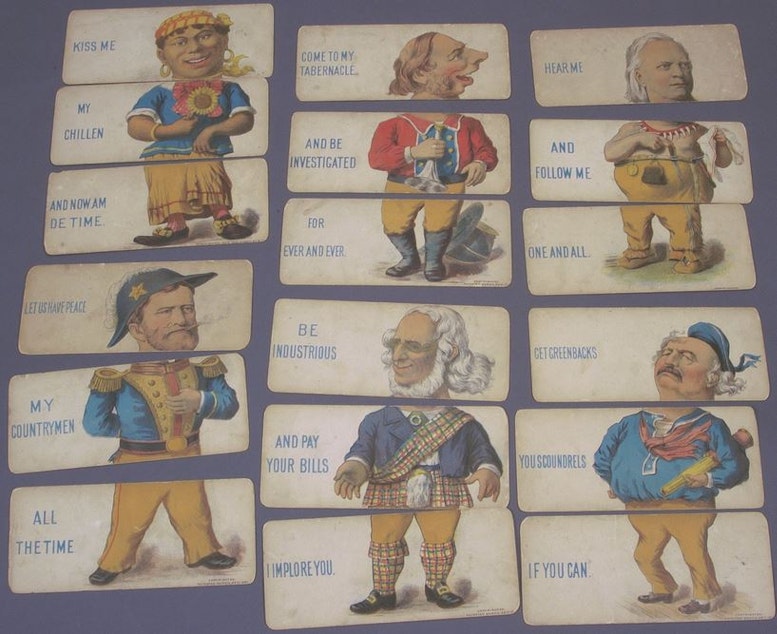Who Will Control The Internet Of The Future?

In 2009, I was interviewing Wired magazine editor Chris Anderson about his book, "Free: The Future of a Radical Price." He argued that people want things for free in this emerging economy, so to make money, you have to figure out sidelines.
For example, musicians could give their music away online, and then make money from live performance or selling T-shirts.
We happened to be doing the interview during our pledge drive, so I asked him about the public radio model of free: listen for free, learn to appreciate it, and then make a pledge.
He flatly refused, which surprised me.
We did the interview on his book, and after I stopped the recording, I asked him why he wouldn’t talk about public radio as an example of the economics of free.
“I’m your worst nightmare,” Anderson said. He said he didn’t listen to his public radio station in the Bay Area but rather to podcasts of his favorite shows like This American Life.
It dawned on me then that disaggregation, a phenomenon I had been learning about in classes for my master’s degree in digital media, was coming to my neighborhood.
Disaggregation, which literally means to take something apart, has hit the media with full force. The term, in a sense, has been the motto of the Internet, taking apart the elements of 20th century media, newspapers, radio and television and redistributing them online.
It started with newspapers.
Classified ads were a cash cow for newspapers. But in 1995, Craig Newmark saw he could use the nascent Web to post free classified ads on the site he called Craigslist. There went classified ads and the beginning of the decline of American newspapers – and ultimately the demise of the print edition of our own Seattle Post-Intelligencer.
And now, TV.
In the past couple of weeks, TV disaggregation took three steps forward.
This week, Federal Communications Commission Chairman Tom Wheeler proposed giving online companies equal access to cable and broadcast stations.
This move would explode the domination cable and satellite television providers currently have. Most cable and satellite TV subscribers only view a few channels but pay for hundreds. If approved, this would allow TV viewers to choose channels a la carte rather than have to pay for expensive packages.
Michael Copps, a former FCC commissioner, told the Takeaway, “The Internet of the future should not be the playground of the few.”
For Copps, this boils down to individual control over the online experience.
“This isn’t about regulation, this is about who is in control of your online experience,” he said. “Will it be the citizen’s control or the ISP’s (Comcast, Verizon) control?”
Most TV networks give limited access their programs online. But the second step forward in disaggregation is CBS’s announcement of an online subscription service that for $5.99 a month will give viewers Web access to full current seasons of 15 primetime shows the day after originally airing, live streaming of 14 local CBS stations, plus full past seasons of shows and a library of more than 5,000 episodes of previous shows including Twin Peaks.
Would this make viewers less likely to tune into their local CBS affiliate? Bill Shrier, former chief technology officer for the City of Seattle is unsure. He does think it would prompt local stations to upgrade their online services, perhaps even charging for a premium version of their local offerings.
The third recent disaggregation move in TV land is HBO’s announcement that they’ll start to deliver their own service directly to viewers by the web, bypassing cable TV companies. As a Breaking Bad fan who bought a cable package just to watch the final episodes, I say, “Yeah!”
But will these recent moves shake up TV. The Economist put the news in perspective:
The announcements by HBO and CBS have prompted dramatic predictions about the end of the television business in its current form. Television executives already share horror stories about how their children have asked them what a “channel” is. … Advertisers and analysts have started to use the word “video” instead of “television,” because they consider online video an increasingly important part of their ad spending.
The doomsaying may be premature. Viewing habits have changed, especially among the young, who watch more online video and time-shifted television, and often prefer to stare at a tablet than at a TV. But Americans continue to watch a remarkable amount of TV the old-fashioned way: around 4 1/2 hours a day, on average. The new stand-alone online offerings will appeal to some consumers, but are unlikely to cause the television business to crack quickly. Consumers who want to cobble together different subscriptions from HBO, Netflix and others may find it is not that much cheaper after paying for broadband.
Regardless of the impact of these three recent moves by the FCC, CBS and HBO, media will continue to be roiled by disaggregation.
And public radio is not immune. Some listeners podcast their favorite public radio programs like Wired’s Anderson.
And NPR One was unveiled at the end of July. It’s essentially Pandora for public radio. Start listening and you’ll hear the most recent newscast followed by NPR stories and local segments from KUOW. Give a story a thumbs up or thumbs down, and you’ll hear more of less of that type of story. It disrupts the traditional way of listening to radio – through your affiliate.
Yikes!

